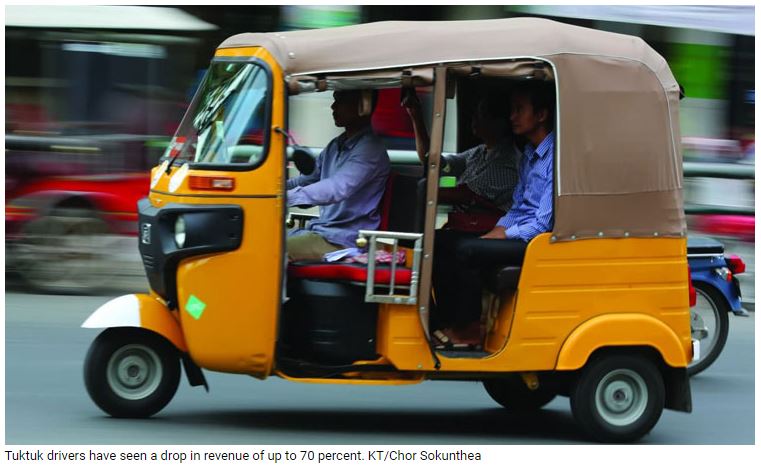Cambodia: Union asks for more help for beleaguered tuktuk drivers
Tuktuk drivers have seen a drop in revenue of up to 70 percent but are still being asked to pay up to 15 percent of it for using ride-hail technology, say representatives.
One of Asia’s oldest and longstanding jobs has seen a shakeup with many drivers looking to leave their jobs to find alternative income because of a lack of customers and charges from multiple ride-hailing apps. Now unions are asking the ride-hailing firms to lower their charges to give the drivers a bigger slice of the pie.
Vorn Pao, president of the Independent Democracy of Informal Economic Association (IDEA), a labour group that works for the protection of the rights of informal workers such as tuktuk drivers, said: “The ride-hailing apps are not playing fair because only the company possesses the technology. The drivers are the ones doing all of the hard work and working so many hours to earn a living yet the apps are taking away 15 percent of their living.”
He added: “We want these companies to reduce the charge to 10 percent because we think this is fair and it will give the drivers the chance to earn more.”
There are an estimated 50,000 tuktuk drivers. That number is decreasing as drivers find new jobs in different sectors with reports that the majority are swaying towards the agricultural and construction.
“We have seen that the majority of people who are giving up their tuktuks and moving towards the agriculture and construction industries are from Siem Reap and Sihanoukville because these places have felt the biggest economic downfall because of COVID-19,” said Pao.
“We hope that when the economy starts to pick up and when tourists start to come back these people will go back to their old jobs and prosper again.”
The government and some banks have tried to help tuktuk drivers with certain initiatives.
“The government have been helping informal workers such as tuktuk drivers register for their Health Equity Fund membership card from the National Social Security Fund (NSSF) and some banks have been allowing drivers to only repay what they owe on their loans and freezing the interest. We hope soon more banks will do the same and ride-hailing apps will also play their part,” added Pao.
Rith Raksa, a Phnom Penh tuktuk driver, said: “Before COVID-19, I could earn around $30 a day and now I struggle to make $10. I have seen many of my friends sell their tuktuks and go back to their home province to work on a farm because there just isn’t the same amount of work as there was before. I don’t want to do that because my friends and family live here. Some friends have even had to sell their vehicles because they needed the money. They now rent a tuktuk for $5 dollars a day.”
Source: https://www.khmertimeskh.com/50781718/union-asks-for-more-help-for-beleaguered-tuktuk-drivers/


 Thailand
Thailand




